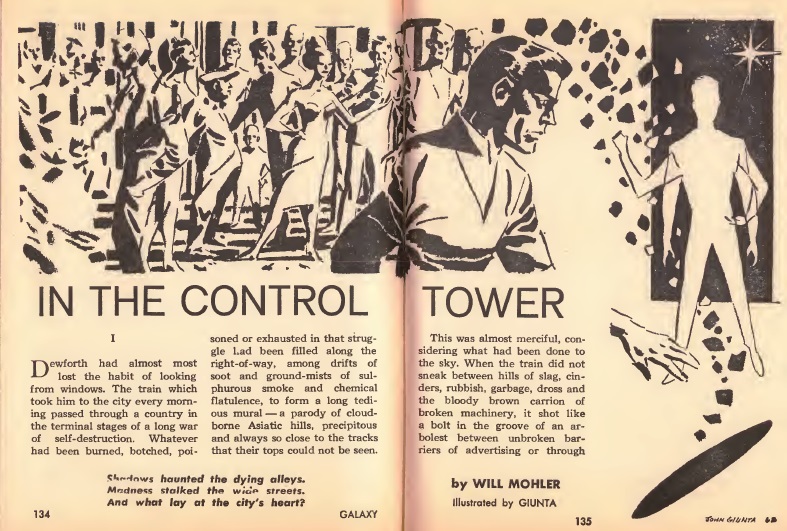
by Gideon Marcus
Identical cousins
My brother Louis and I diverge quite a lot. He's an observant Jew, I'm an atheist. He served in World War 2 (drafted into the Navy), I did not. He's an affluent pawnbroker. I'm a writer of questionable success.

But where we differ the most is the subjects of our avocational devotion. Lou loves opera. Specifically operas written in 1812 between October and November. I kid, but his musical tastes are really quite narrow; his radio knob never turns from the FM classical stations. I am far more catholic in my interests, enjoying everything from classical, to the swing of my teen years, to the brand new sounds.
Also, Lou hates science fiction.
Interestingly, his son David (thus, my nephew), loves SF as much as I do. Must be this newfangled "generation gap" we're starting to hear about.

For the last 15 years or so, he and I have swapped recommendations, and he's even lent me some of his magazines. Our tastes are not identical. He recently canceled his subscription to The Magazine of Fantasy and Science Fiction, and he is a big fan of Analog. But we have some strong overlap, particularly where it comes to Galaxy. In fact, that picture is him in his San Pedro home enjoying this month's issue.
I am thankful that my own daughter, David's first cousin, is also a devoted science fiction fan. I'd hate to have to throw her out of the house before her eighteenth birthday.

Kidding, again! I'd surely wait for her to be of age before disowning her.
But, that's not anything we have to worry about, for we are all one big happy family of fen, and we all dug the December 1966 Galaxy — read on and see why!
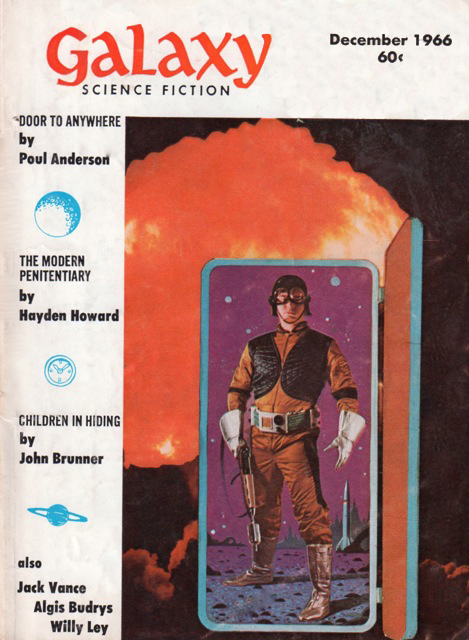
by Paul E. Wenzel
The issue at hand
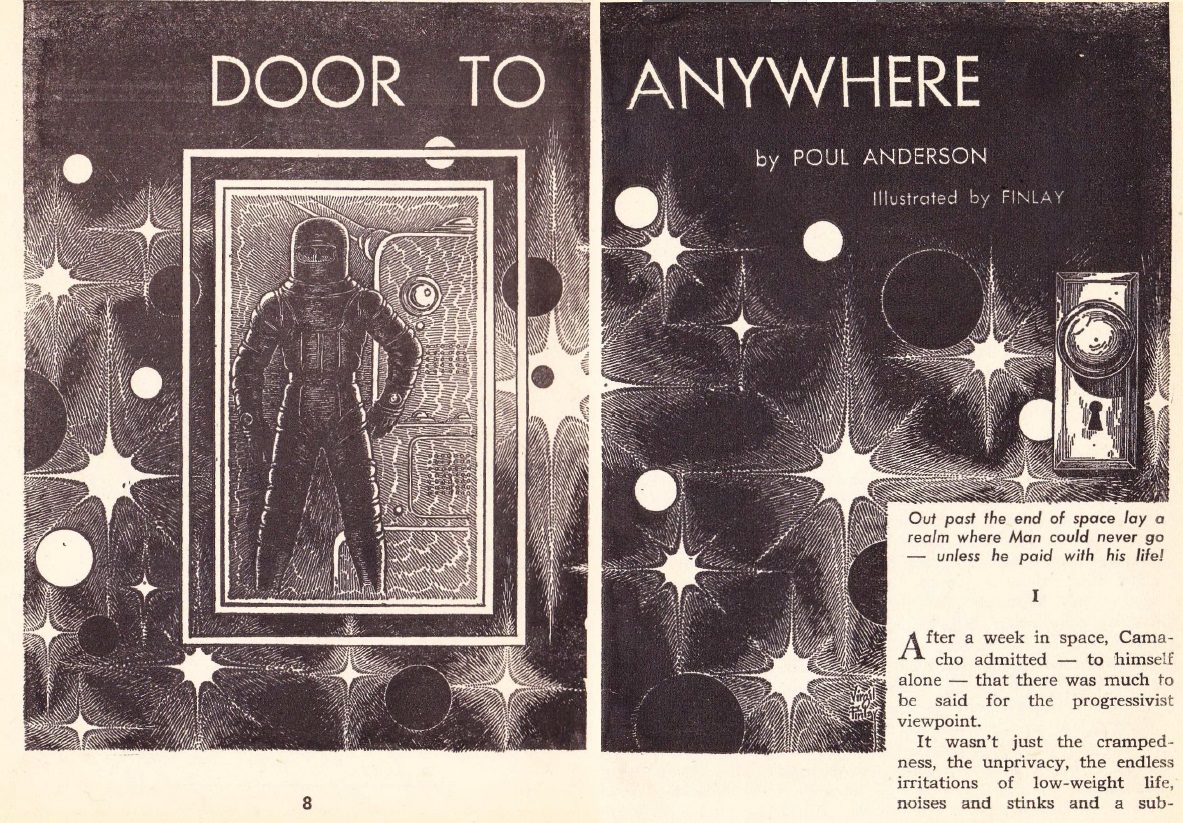
by Virgil Finlay
Door to Anywhere, by Poul Anderson
Humanity has developed teleportation technology, and Mars has become a hub for galactic exploration. But a recent jaunt to the edge of the known universe caused the destruction of several portals and the loss of a senator's brother-in-law. Now the politician has arrived on the Red Planet to investigate.
When Poul Anderson sets his mind to it, he can write. Not only is this an effective story, with the mystery disclosed one layer at a time, but it is technically interesting. It's the first depiction of teleportation I've read that takes relative velocities into consideration. A trip to a nearby star could require hops to a dozen intermediaries across the galaxy, or multiple galaxies, to ensure the difference in relative momenta is not too great. I also appreciated the political discussion over the virtues and peril of building a teleporter too close to the Earth.
Where the story falters to some degree is its characterization: Anderson is still in the Kowalski, Yamamoto, Singh habit of defining players by their nationality — and women are strangely absent. Also, the Hoylean/Hubblean fusion of cosmological theories seems like a lot of gobbledegook.
Nevertheless, it's a riveting read. Definitely four stars.
Children in Hiding, by John Brunner
I'm told there are two John Brunners. One is the brilliant Englishman who produced Listen…the Stars! and The Whole Man, both Star-winners and Hugo nominees. The other is the American who produces schlock.
The latter wrote Children in Hiding. The premise: the children on a colony world are born healthy but never develop mental capacities beyond that of infants. A terran troubleshooter is brought in to fix the problem. He does, but not to the benefit of the colony.
There's a lot of angry dialogue and excessive use of exclamation points, and the end is just stupid. I'll give the piece two stars because both Brunners write coherently, but all in all, it's a disappointing story.
The Modern Penitentiary, by Hayden Howard
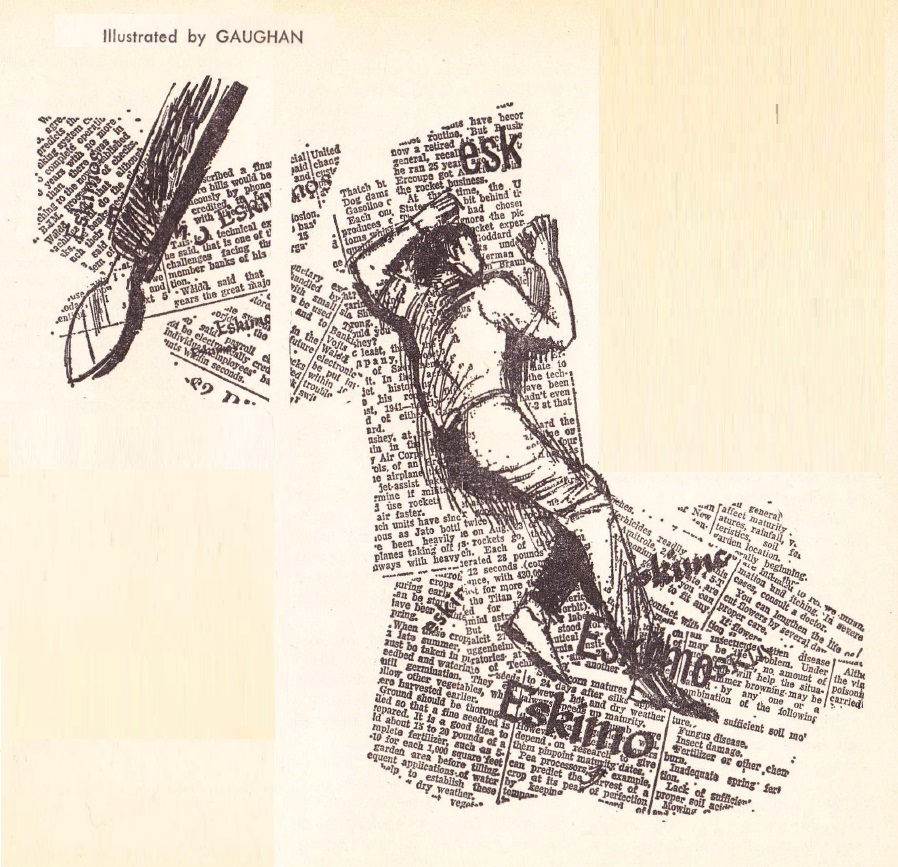
by Jack Gaughan
Ah, and now we have another story of the Esks, a race of Eskimo/alien hybrids that spawn children every month. Children that mature in five years. Throughout the series, we've seen the Esks explode in population, exhausting their environment and crowding out the real Eskimos. In this, they are facilitated by the do-gooder Canadians, who refuse to see the Esks for the meance they are. Instead, they give the Esks food, relocate them to other areas, etc.
Only one man, Dr. West (who always conjures up the Lovecraft character), knows the truth. When no one listened to his Cassandra cry, he tried to sterilize them with a disease (last story). The plan backfired, killing 23 actual Eskimos. For this, he was imprisoned in the nicest cell ever, complete with a therapeutic nurse-lover. Modern Penitentiary details West's attempts to escape, as well as his rather difficult-to-read sexual adventures.
These installments stand less and less on their own, and they become more implausible every time. Thankfully, we've only one left.
Two stars.
For Your Information: The Sound of the Meteors, by Willy Ley
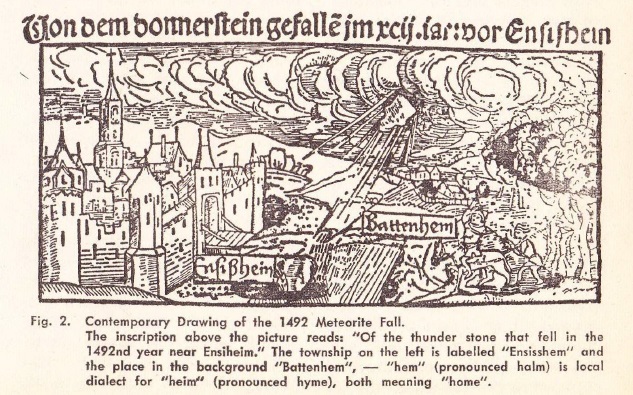
I really dug this article, all about whether or not one can hear a meteor. It was timely, too, as I read it right before our trip out to the desert to stargaze last weekend.
Four stars (and enjoy these pictures of Borrego Springs!)






At the Bottom of a Hole, by Larry Niven
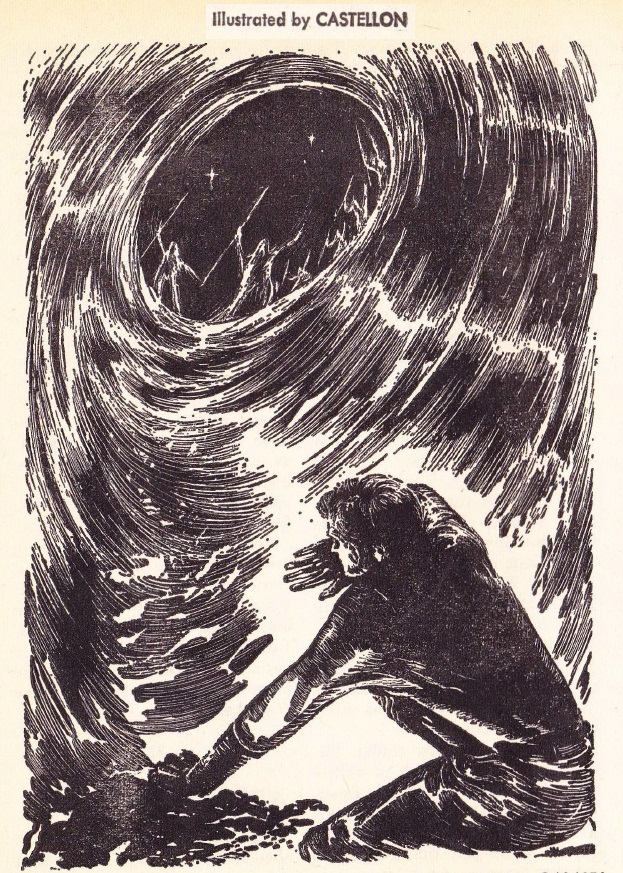
by Hector Castellon
The latest Niven story is another set on Mars, a locale we've visited in Eye of the Octopus and How the Heroes Die. Hole takes place a good seventy years after the last story. A smuggler on the run from Belter cops tries to take refuge on Mars at the old base. He finds the crew long dead, murdered when someone, or several someones, slashed their bubble. Was it Martians?
The story also features the return of Luke Garner and Lit Schaeffer from World of Ptavvs, tying Mars to that universe. Along with this month's A Relic of the Empire, which ties Ptavvs in with The Warriors (featuring the Kzinti) and the Beowulf Schaeffer stories set several centuries hence, it appears Niven has knit together six hundred years of future history to play in. Fun stuff!
Four stars.
Decoy System, by Robin Scott
This is a Mack Reynoldsy thriller featuring an American agent's meeting with his Soviet counterpart. Some third party has been sabotaging both the US and USSR's early warning systems so that they will indicate massive nuclear strikes. Aliens are determined to be the culprit. An era of peace and cooperation ensues.
Of course, it was all a Yankee plot. I think I'd have liked this story if I hadn't read the premise before (and seen it as recently as The Architects of Fear). It feels a lot like an Analog story. Also, it's a lot of buildup for an ending that is obvious early on.
Two stars.
The Palace of Love (Part 2 of 3), by Jack Vance
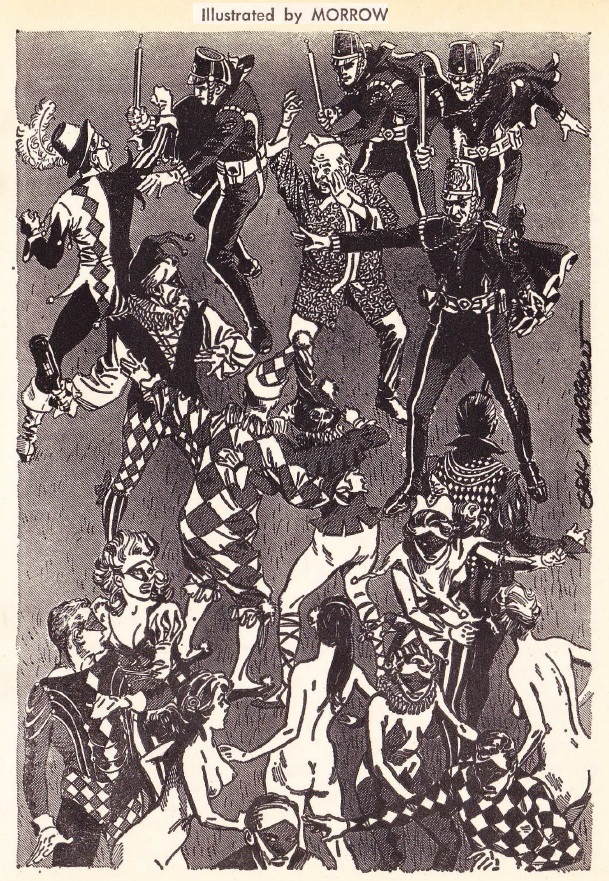
by Gray Morrow
Last time, if you'll recall, I hadn't been overly enamored with Jack Vance's latest novel, a direct sequel to The Star King. Kirth Gersen, a rich and supertalented assassin, is on the hunt for Viole Falushe, one of the "Demon Kings" of crime who murdered his parents. The prior installment took us to Earth, where Gersen, disguised as a reporter (working for a paper he has purchased), investigates Falushe's childhood home. Back then, he was known as Vogel Filschner. His best friend and inspiration, before he went into kidnapping and slaving, was the poet, Garnath.
It is the houseboat-dwelling, nigh-incomprehensible Garnath, who provides Gersen his opportunity to meet and kill Falushe. Along the way, he becomes increasingly entangled with Garnath's ward, "Zan Zu of Eridu", who is an exact likeness of Falushe's childhood infatuation.
The first two thirds, in which Gersen plays a cat and mouse game with Falushe, is riveting. The final section, which sees Falushe invite Gershen to his private sanctum ("The Palace of Love") in the far reaches of space, is heavy on description but light on interest.
Still, I'd give this section four stars. It'll be up to the last installment to determine if the whole affair ends up on the three or four star side of the ledger.
Primary Education of the Camiroi, by R. A. Lafferty
Last up, an obtuse piece on the differences in educational policy and success between two planets. It's supposed to be whimsical (when isn't the word applied to Lafferty?), but it's mostly tired.
Two stars.
Summing up
Finishing up at 3.1 stars, I'd say Fred Pohl has done his job to keep Galaxy on our subscription lists for another year at least. And I do mean our — you have to count me in, too!

[Speaking of stories you and your family will enjoy, Sirena, the second book in The Kitra Saga, is out! Fun for adults, young and old.
Buy a copy…you'll be supporting me and getting a great read at the same time!]

![[November 12, 1966] A Family Tradition (December 1966 <i>Galaxy</i>)](https://galacticjourney.org/wp-content/uploads/2021/11/661112cover-469x372.jpg)


![[January 8, 1964] A Taste of Homely (February 1964 <i>Galaxy</i>)](https://galacticjourney.org/wp-content/uploads/2019/01/640108cover-570x372.jpg)





![[November 9, 1963] Change and Constancy (December 1963 <i>Galaxy</i>)](https://galacticjourney.org/wp-content/uploads/2018/11/blog631109cover-400x372.jpg)








